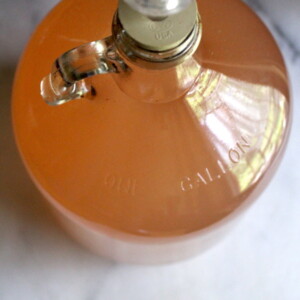Watermelon Wine
Watermelon wine is a tasty way to preserve watermelon for year-round sipping!
Servings: 20 glasses (1 gallon, about 4 bottles)
Equipment
Ingredients
- 3 quarts watermelon juice from 15 to 18lbs watermelon
- 2 lbs sugar 4 cups or 2 1/4 lbs honey for watermelon mead
- 2 tsp Acid Blend or 2 Tbsp. Lemon or Lime Juice
- 1/8 tsp tannin powder
- 1 tsp. Yeast Nutrient
- 1 Camden Tablet Strongly recommended
- 1 wine yeast see notes
Instructions
- Juice the watermelon and place it in a fermentation bucket. Crush up a Camden tablet and add it to the watermelon juice, stirring to incorporate. Cover closely with a towel and wait 24 hours before proceeding.
- Dissolve the sugar (or honey for mead) in a quart of water and bring to a boil on the stove to dissolve. Allow it to cool before adding it to the watermelon juice. (You can also use raw honey, but it's tricky to get it to dissolve. You'll need to stir the mixture for some time to fully incorporate everything, and it helps if the ingredients are warm.)
- Add the remaining ingredients (except yeast) and stir to incorporate.
- Dissolve the packet of yeast in 1/4 to 1/2 cup of filtered unchlorinated water. Allow the yeast to "bloom" for 10 minutes before adding it to the watermelon mixture.
- Cover the fermenter loosely with a towel and allow the mixture to ferment for 10-14 days (7 to 10 days if in a warm room) until vigorous fermentation slows. (You can also use a water lock sealed fermenter here, which helps to further reduce the risk of contamination. If you do, be prepared to clean out the water lock daily.)
- After primary fermentation, use a siphon to move the watermelon wine to a clean narrow neck fermenter. Fill with additional water or sterilized fruit juice until the carboy is full to the base of the neck of the carboy. Seal with a water lock.
- Allow the mixture to ferment in secondary for 3 to 6 months. (Be sure to keep the water lock sealed, and add water if necessary as the water evaporates.)
- After secondary, bottle the wine in corked wine bottles.
- Allow the wine to bottle condition for at least 2 months (preferably longer) before drinking. Enjoy chilled.
Notes
I've described what I think is the best method, using watermelon juice from fresh watermelon. For other options,
see the full article where I go through variations. The Camden tablet is strongly recommended. I generally don't sterilize juice for winemaking, but watermelon
wine is the exception. It's incredibly susceptible to contamination and I have not successfully made watermelon wine without first sterilizing the juice. It always goes off in fermentation (I've tried at least a dozen recipes, I just
can't get it to work without a Camden tablet). For wine yeast, I'd suggest: Lalvin D47 contributes tropical fruit and citrus notes, and will leave considerably more residual sugar than plain champagne yeast (15% alcohol tolerance). This is a good choice for watermelon mead and moderate to sweet watermelon wines. Red Star Cotes de Blanc adds floral/fruity notes and will finish with a good bit of residual sugar (14% alcohol tolerance). Champagne yeast for a neutral, dry watermelon wine. (18% alcohol tolerance) It leaves little residual sugar and you may need to back sweeten before bottling. Lalvin K1-V1116 wine yeast will contribute floral/fruity flavors tot the wine, and is a better choice than simple champagne yeast. It'll also produce a very dry wine (18% alcohol tolerance), and may need back sweetening.
Increase the time in secondary fermentation to 4-6 months as yeast metabolize honey much slower than sugar.
see the full article where I go through variations. The Camden tablet is strongly recommended. I generally don't sterilize juice for winemaking, but watermelon
wine is the exception. It's incredibly susceptible to contamination and I have not successfully made watermelon wine without first sterilizing the juice. It always goes off in fermentation (I've tried at least a dozen recipes, I just
can't get it to work without a Camden tablet). For wine yeast, I'd suggest: Lalvin D47 contributes tropical fruit and citrus notes, and will leave considerably more residual sugar than plain champagne yeast (15% alcohol tolerance). This is a good choice for watermelon mead and moderate to sweet watermelon wines. Red Star Cotes de Blanc adds floral/fruity notes and will finish with a good bit of residual sugar (14% alcohol tolerance). Champagne yeast for a neutral, dry watermelon wine. (18% alcohol tolerance) It leaves little residual sugar and you may need to back sweeten before bottling. Lalvin K1-V1116 wine yeast will contribute floral/fruity flavors tot the wine, and is a better choice than simple champagne yeast. It'll also produce a very dry wine (18% alcohol tolerance), and may need back sweetening.
Increase the time in secondary fermentation to 4-6 months as yeast metabolize honey much slower than sugar.
Nutrition
Calories: 217kcal | Carbohydrates: 56g | Protein: 1g | Fat: 0.4g | Saturated Fat: 0.02g | Polyunsaturated Fat: 0.1g | Monounsaturated Fat: 0.1g | Sodium: 2mg | Potassium: 160mg | Fiber: 1g | Sugar: 54g | Vitamin A: 808IU | Vitamin C: 12mg | Calcium: 10mg | Iron: 0.4mg
